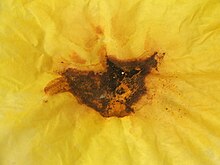This is the current revision of this page, as edited by Citation bot (talk | contribs) at 21:57, 21 January 2023 (Add: url. | Use this bot. Report bugs. | Suggested by Corvus florensis | #UCB_webform 1419/1800). The present address (URL) is a permanent link to this version.
Revision as of 21:57, 21 January 2023 by Citation bot (talk | contribs) (Add: url. | Use this bot. Report bugs. | Suggested by Corvus florensis | #UCB_webform 1419/1800)(diff) ← Previous revision | Latest revision (diff) | Newer revision → (diff)
| |

| |
| Names | |
|---|---|
| IUPAC name Nickel(II) chromate | |
| Other names
nickelous chromate nickel chromate nickel(II) chromium(VI) oxide | |
| Identifiers | |
| CAS Number | |
| 3D model (JSmol) | |
| ChemSpider | |
| ECHA InfoCard | 100.035.227 |
| EC Number |
|
| PubChem CID | |
| CompTox Dashboard (EPA) | |
InChI
| |
SMILES
| |
| Properties | |
| Chemical formula | NiCrO4 |
| Molar mass | 174.71 g/mol |
| Appearance | dark maroon-colored powder |
| Solubility in water | very slightly soluble in water |
| Solubility | soluble in hydrochloric acid |
| Hazards | |
| Flash point | Non-flammable |
| Related compounds | |
| Other anions | nickel(II) molybdate nickel(II) tungstate |
| Other cations | magnesium chromate cadmium chromate |
| Except where otherwise noted, data are given for materials in their standard state (at 25 °C , 100 kPa).
| |
Nickel(II) chromate (NiCrO4) is an acid-soluble compound, red-brown in color, with high tolerances for heat. It and the ions that compose it have been linked to tumor formation and gene mutation, particularly to wildlife.
Synthesis
Nickel(II) chromate can be formed in the lab by heating a mixture of chromium(III) oxide and nickel oxide at between 700 °C and 800 °C under oxygen at 1000 atm pressure. It can be produced at 535 °C and 7.3 bar oxygen, but the reaction takes days to complete. If the pressure is too low or temperature too high but above 660 °C, then the nickel chromium spinel NiCr2O4 forms instead.
Karin Brandt also claimed to make nickel chromate using a hydrothermal technique.
Precipitates of Ni ions with chromate produce a brown substance that contains water.
Properties
The structure of nickel chromate is the same as for chromium vanadate, CrVO4. Crystals have an orthorhombic structure with unit cell sizes a = 5.482 Å, b = 8.237 Å, c = 6.147 Å. The cell volume is 277.6 Å with four formula per unit cell.
Nickel chromate is dark in colour, unlike most other chromates which are yellow. The infrared spectrum of nickel chromate show two sets of absorption bands. The first includes lines at 925, 825, and 800 cm due to Cr-O stretching, and the second has lines at 430, 395, 365 (very weak) due to Cr-O rock and bend and 310 cm produced from Ni-O stretching.
Reaction
When heated at lower oxygen pressure around 600 °C, nickel chromate decomposes to the nickel chromite spinel, nickel oxide and oxygen.
- 4 NiCrO4 → 2 NiCr2O4 + 2 NiO + 3 O2 (gas)
Related
Nickel chromates can also crystallize with ligands. For instance, with 1,10-phenanthroline it can form triclinic olive-colored crystals of •H2O, orange crystals of Ni(1,10-phenanthroline)3Cr2O7•3H2O, and yellow powdered Ni(1,10-phenanthroline)3Cr2O7•8H2O.
References
- Perry, Dale L. (19 April 2016). Handbook of Inorganic Compounds, Second Edition. CRC Press. p. 290. ISBN 9781439814628.
- Eisler, R. (1998). Nickel Hazards to Fish, Wildlife, and Invertebrates: a Synoptic Review. Laurel: U.S. Geological Survey
- ^ Muller, Olaf; Roy, Rustum; White, William B. (December 1968). "Phase Equilibria in the Systems NiO-Cr2,O3,-O2, MgO-Cr2O3-O2, and CdO-Cr2,O3,-O2, at High Oxygen Pressures". Journal of the American Ceramic Society. 51 (12): 693–699. doi:10.1111/j.1151-2916.1968.tb15930.x.
- Brandt, Karin (1943). "X-Ray Analysis of CrVO4 and isomorphous compounds". Arkiv för Kemi, Mineralogi och Geologi. 17A (6): 1–13. (not consulted)
- ^ Muller, Olaf; White, William B.; Roy, Rustum (September 1969). "X-ray diffraction study of the chromates of nickel, magnesium and cadmium". Zeitschrift für Kristallographie. 130 (1–6): 112–120. Bibcode:1969ZK....130..112M. doi:10.1524/zkri.1969.130.1-6.112.
- ^ Bronowska, W; Staszak, Z; Daszkiewicz, M; Cieślak-Golonka, M; Wojciechowska, A (May 2002). "Systematic investigation of the system; dichromate species isolated from alkaline solutions". Polyhedron. 21 (9–10): 997–1003. doi:10.1016/S0277-5387(02)00912-9.
- Baran, E. J (May 1998). "Materials belonging to the CrVO4 structure type: preparation, crystal chemistry and physicochemical properties". Journal of Materials Science. 33 (10): 2479–2497. Bibcode:1998JMatS..33.2479B. doi:10.1023/A:1004380530309. S2CID 97516785.
- Muller, Olaf; White, William B.; Roy, Rustum (August 1969). "Infrared spectra of the chromates of magnesium, nickel and cadmium". Spectrochimica Acta Part A: Molecular Spectroscopy. 25 (8): 1491–1499. Bibcode:1969AcSpA..25.1491M. doi:10.1016/0584-8539(69)80133-9.
| Nickel compounds | |
|---|---|
| Nickel(0) | |
| Nickel(II) | |
| Nickel(III) | |
| Nickel(IV) | |
| Chromates and dichromates | |||||
|---|---|---|---|---|---|
| Chromates |
| ||||
| Dichromates | |||||
| Related | |||||